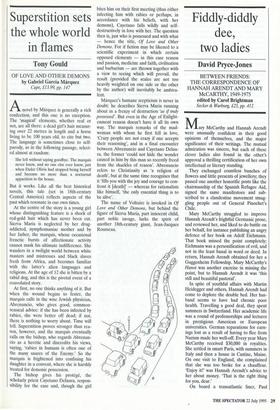Fiddly-diddly dee, two ladies
David Pryce-Jones
BETWEEN FRIENDS: THE CORRESPONDENCE OF HANNAH ARENDT AND MARY McCARTHY, 1949-1975 edited by Carol Brightman
Seeker & Warburg, £25, pp. 412
Mary McCarthy and Hannah Arendt were unusually confident in their good opinions of themselves, and the major significance of their writings. The mutual admiration was sincere, but each of these clever ladies also found in the other's approval a thrilling certification of her own intellectual or literary standing.
They exchanged countless bunches of flowers and little presents of jewellery; they passed one another honorific posts like the chairmanship of the Spanish Refugee Aid, signed the same manifestoes and sub- scribed to a clandestine movement smug- gling people out of General Pinochet's Chile.
Mary McCarthy struggled to improve Hannah Arendt's frightful Germanic prose, and reviewed her, and liked to do battle on her behalf, for instance publishing an angry defence of her book on Adolf Eichmann.
That book missed the point completely; Eichmann was a personification of evil, and not in the least banal in word or deed. In return, Hannah Arendt obtained for her a Guggenheim Fellowship. Mary McCarthy's Hanoi was another exercise in missing the point, but to Hannah Arendt it was 'this still and beautiful pastoral'.
In spite of youthful affairs with Martin Heidegger and others, Hannah Arendt had come to deplore the double bed. Her hus- band seems to have had chronic poor health. Travelling a good deal, they spent summers in Switzerland. Her academic life was a round of professorships and lectures in prestigious American or European universities. German reparations for earn- ings lost as a result of having to flee from Nazism made her well-off. Every year Mary McCarthy received $30,000 in royalties.
She settled in smart Paris, with summers in Italy and then a house in Castine, Maine.
On one visit to England, she complained that she was too broke for a chauffeur. 'Enjoy it!' was Hannah Arendt's advice to her about money. 'That is the right thing for you, dear.'
On board a transatlantic liner, Paul Tillich tried to seduce Mary McCarthy, behaviour on the part of an eminent theologian which induced in her 'a psychic shock'. Next she had an affair with John Davenport, a Falstaff of Grub Street. Discarding the unwanted husband of that moment, she married an American diplomat then serving in Warsaw, 'with a very good rank, just below that of minister, imagine, and $3,300 a year for housing'. Hannah Arendt had a surprise in store too. Not long widowed, she was visited by W. H. Auden, who proposed to her. Turned down flat, he staggered off very drunk.
Much of the correspondence consists in clearing away acquaintances and competi- tors. A first glance was enough for a sweep- ing generalisation. Rebecca West was 'cracked', Mary McCarthy wrote, Natalie Sarraute made a 'a strangely unpleasant finpression', she did not really like the Moravias, Robert Lowell was too mad and his first wife, Elizabeth Hardwick, rattled on 'like a child's toy'. The French were 'hysterical and chauvinistic' and she longed to get into a fight with the whole country, or perhaps just with Sartre and de Beauvoir. Arabs were 'odious and unattrac- tive', and they also had a 'psychic emana- tion'.
As for Hannah Arendt, there was something in Vladimir Nabokov she greatly disliked, Truman Capote was 'very unpleas- ant, vain and vulgar', President Johnson was not just bad or stupid but `kind of insane'. Russians had a 'hugely unpleasant national character'. Complaining regularly of the malice and hostility of others, the ladies ascribed such reactions to envy and bad character. They could not imagine that their own assumptions of superiority might be connected to the human difficulties they experienced. Self-examination was not their strong card.
Over political issues, they parted compa- ny altogether with reality. They searched high and low for revolution, detecting it behind the Warren Report, in the plays of Rolf Hochhuth, in the student demonstra- tions of 1968, in what Mary McCarthy liked to call 'Resistance' to the Vietnam War, as though she were living in Vichy France.
Anti-communism, she judged, was more of 'a danger than Communism itself. Nixon was setting up a police state. 'The techno- logical fabric' was coming apart. She predicted a sort of universal civil war'. If you wanted law and order and proper police protection, you would defect behind the Iron Curtain. Black Power, the revolu- tionary left and the fascists were in a race to grab the house in Castine and to take her away too. In the circumstances, it was hard to celebrate Christmas and to be consoled with haute-couture dresses.
America was indeed falling behind in science, Hannah Arendt agreed, and this would soon end in catastrophe. Every step in the Vietnam war prompted her to revile what she saw as 'the whole monstrosity of our enterprise'. She did not in fact believe that fascism or communism would win in America but only that lawlessness would prevail. In May 1969 she was afraid that 'it looks like the end of the Republic, though not necessarily of the country'. She and her husband had plans to flee to Switzerland.
Unaware that they were misrepresenting and abusing the freedoms and privileges of a period of unprecedented peacefulness and prosperity, the ladies strayed on to peaks of higher idiocy. It is marvellous comedy to watch them wrecking their own earnest claims to be leading voices of our time.



















































 Previous page
Previous page